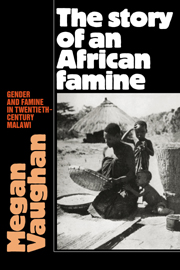Book contents
- Frontmatter
- Contents
- List of maps
- List of illustrations
- Preface
- Glossary
- Introduction
- 1 The 1949 famine
- 2 Famine as a Malthusian crisis
- 3 Famine as a failure of the market
- 4 Food entitlement and employment
- 5 Gender and famine
- 6 After the famine: a conclusion
- Notes
- List of oral interviews
- Bibliography
- Index
6 - After the famine: a conclusion
Published online by Cambridge University Press: 05 November 2009
- Frontmatter
- Contents
- List of maps
- List of illustrations
- Preface
- Glossary
- Introduction
- 1 The 1949 famine
- 2 Famine as a Malthusian crisis
- 3 Famine as a failure of the market
- 4 Food entitlement and employment
- 5 Gender and famine
- 6 After the famine: a conclusion
- Notes
- List of oral interviews
- Bibliography
- Index
Summary
Viewing the famine as a Malthusian crisis, the Department of Agriculture saw its occurrence as a confirmation of its views on African agriculture, the need for conservation measures, and greater government intervention. The main lines of the Department's policy were not altered by the experience of the famine, but pursued with greater vigour and urgency as a result. In 1950 an increasing number of subordinate European Field Staff were employed ‘in an attempt to inculcate into African peasants certain basic elementary principles and practices in the shortest possible time’ (Nyasaland Protectorate, Department of Agriculture, Annual Report 1950, p. 5). There was to be greater intervention by the Department, and greater concentration of efforts on those Africans seen as ‘progressive elements’ who could act as examples to the masses. In the short term, however, there was one important change in policy, and this was the raising of the producer price for maize – a measure which, as we have seen, had been long resisted by the Department.
In 1950 maize was bought by the Maize Control Board at id. per lb, which was double the price paid prior to the famine. Buying by the Board was permitted in all areas where a surplus seemed likely. It was a good harvest, despite the difficulties some people experienced in getting seed, and despite the fact that so many people were weakened by hunger at the time when their labour was most needed on the crop. After the inflated prices of the famine, it was feared that producers would not sell, even at this comparatively high official price.
- Type
- Chapter
- Information
- The Story of an African FamineGender and Famine in Twentieth-Century Malawi, pp. 148 - 159Publisher: Cambridge University PressPrint publication year: 1987



